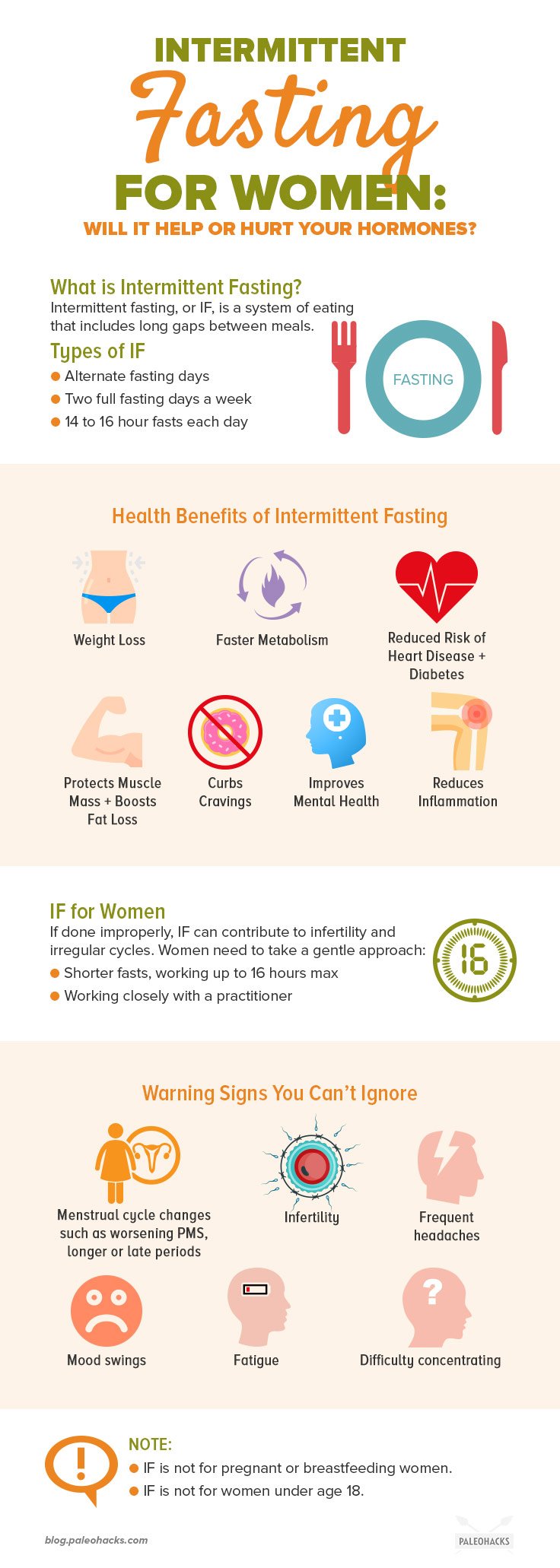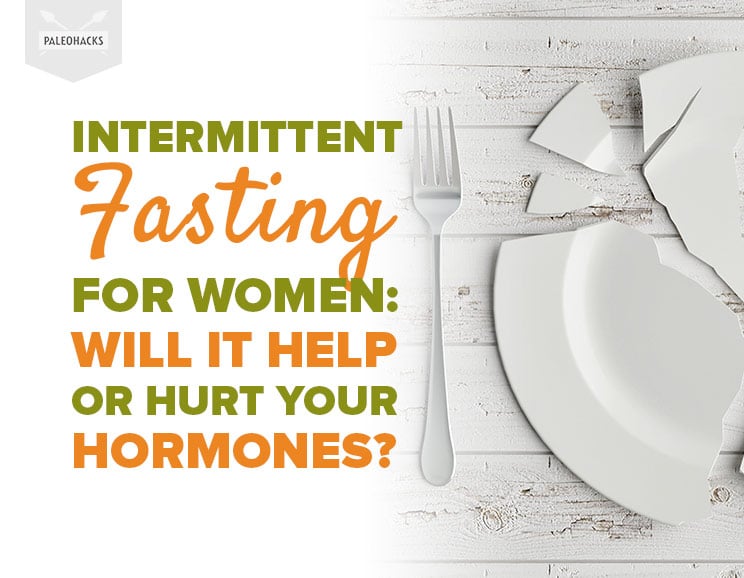Will skipping breakfast help your hormones – or hurt them? Here, we’ll cover the benefits of intermittent fasting for women, warning signs to look out for, and how to make it work for you.
Intermittent fasting has become associated with rapid weight loss and has become increasingly popular in the last few years.
Instead of focusing on specific foods to eat, intermittent fasting, also referred to as IF, teaches you when to eat. The theory behind IF is that by structuring the times that you eat, you can optimize your body’s ability to burn fat and lose weight.
Struggling to lose weight? Unable to focus? Chances are, your hormones are out of whack.
Grab Our FREE Guide To Fixing Your Hormones By Clicking Here!
What is Intermittent Fasting?

Unlike strict fasting, the system of IF focuses on stretching the gaps between meals to allow for the benefits of fasting without the full deprivation of food.
IF can refer to alternate fasting days, two full fasting days a week, or – most commonly – 14 to 16-hour fasts each day. What this last one looks like in daily life is eating your first meal around noon, followed by a smaller afternoon meal, and then a larger dinnertime meal around six or seven PM. By restricting daily food intake into a shorter chunk of time, it allows the digestive system to benefit from 14 to 16 hours of “rest” time, and can also help to reduce food cravings, snacking habits, and excessive food intake.
Intermittent fasting specifically focuses on the timing of meals and does not specify which foods to eat, how much, or what to avoid. However, you can combine your Paleo lifestyle with IF for a more customized approach to nutrition.
8 Health Benefits of Intermittent Fasting
1. Weight Loss

Because it naturally eliminates one daily meal and mindless snacking, intermittent fasting reduces the overall volume of food intake. For some who struggle with overeating or just snacking as a habit, this can help lead to natural weight loss. (1)
Because IF increases the time between meals, it encourages the body to dip into fat stores for energy, but not to the same extreme degree as the keto diet. This means fat loss without following a rigid dietary program or tracking macros.
2. Reduced Risk of Heart Disease and Diabetes
Not only can intermittent fasting help reduce body weight, it can also reduce the risk of heart disease and diabetes, two chronic problems which are rapidly increasing in our modern, over-stressed society. (2, 3)
IF can have a positive effect on insulin levels and blood glucose, especially when paired with a Paleo diet, which also independently reduces the risk of chronic conditions. (4)
3. Faster Metabolism
While intermittent fasting can lead to weight loss through reduced food intake, it also revs the engine of the body’s metabolic function and can increase how effectively metabolism works. (5)
4. Protects Muscle Mass and Boosts Fat Loss

In most calorie-restricted weight loss programs, people lose both fat and muscle. Research shows that IF can be protective of muscle mass and lead to greater fat loss. (6)
Instead of sacrificing muscle mass in the quest to lose weight, the increase in human growth hormone that is brought on by periodic short fasts can actually help maintain and increase muscle mass.
5. Curbs Cravings
While most might think it sounds miserable to only eat during six hours of the day, IF also results in minimized food cravings and can lead to reduced feelings of hunger. It also helps to balance out the hormones that regulate appetite. (7)
6. Improves Mental Health

IF has the potential to improve mental health and well-being, specifically depression, in people who are obese or are prone to binge eating. (8) These benefits are tied into the anti-inflammatory response and the balanced hormone levels that regulate appetite.
7. Reduces Inflammation
Because of the ability to regulate insulin and glucose in some, intermittent fasting can also lead to reduced systemic inflammation. (9) This makes IF an attractive approach to anyone dealing with autoimmunity or other inflammatory disorders.
Intermittent Fasting for Women: Does It Need to be Modified?

It’s true that intermittent fasting can provide amazing benefits, but it’s important to consider factors unique to women. Some research shows that intermittent fasting can actually cause more negative side effects in women versus men depending on the type of approach. Alternate day fasting, for example, can worsen glucose tolerance in women, whereas it tends to improve it in men. (10)
Women are sensitive to sudden dietary shifts. This can specifically be seen in a woman’s menstrual cycle since the hormones that regulate every phase of menstruation are heavily influenced by glucose and food intake. (11) Intermittent fasting done to an extreme could contribute to menstrual irregularity and even amenorrhea, or the absence of menstruation. It can also influence bone density. (12) While human studies are limited, prolonged rat studies have shown that alternate day fasting can lead to smaller ovaries, infertility and irregular cycles. (13)
Does this mean that women can’t use the principles of intermittent fasting at all? Not necessarily, although it’s important to note that extreme anything often shows up in the menstrual cycle. If you’re already menopausal, it can show up in bone density problems and thyroid hormone disruption.
In order to harness the benefits of IF without the negative side effects, women need to take a gentle approach. This typically means:
- Shorter fasts to begin with, a few days per week, from 10 to 12 hours, leading up to 14. Max fasting time should be 16 hours.
- Working closely with a practitioner to determine optimal fasting times and frequency if you already have hormone problems, chronic disorders, or want to become pregnant.
- IF is not for pregnant or breastfeeding women.
- IF is not for women under age 18.
Other approaches that offer similar benefits to IF but which aren’t chronically harmful to hormone levels could include eating tightly restricted calories one or two days per week (between 500 to 800 calories – essentially two small meals) or following a “bone broth diet” a few days per week where the majority of your food intake is bone broth, with a small meal for dinner.
Warning Signs You Can’t Ignore

It’ important to remember that intermittent fasting isn’t for everyone. Here are common signs that your IF plan is causing imbalances in your body: (14, 15)
- Menstrual cycle changes such as worsening PMS, longer or late periods
- Infertility
- Frequent headaches
- Mood swings, or feeling more depressed or anxious than usual
- Fatigue
- Difficulty concentrating
Additionally, it is vital to seek the counsel of your medical practitioner before starting intermittent fasting if you…
- Struggled with eating disorders at any time.
- Have diabetes, thyroid problems, or hypoglycemia.
- Are underweight
- Suffer from a digestive disorder that is associated with nutrient deficiency like Crohn’s disease or Celiac disease.
The Bottom Line
Intermittent fasting can be a beneficial dietary modification for some women, but it’s important to pay attention to signs that it might not be working for you. Even if it does work for you, it isn’t necessarily a long-term option. Remember to reevaluate your diet every few months to reflect what’s best for your nutritional needs.

(Read This Next: What’s the Best Way to Do Intermittent Fasting?



 Yoga for Osteoporosis: 9 Simple Poses to Reverse Bone Loss
Yoga for Osteoporosis: 9 Simple Poses to Reverse Bone Loss









Show Comments